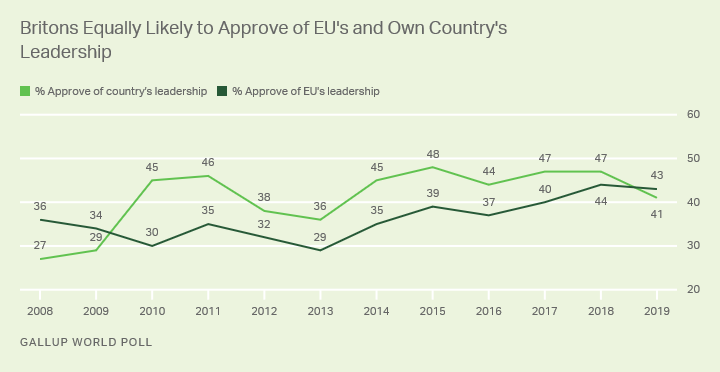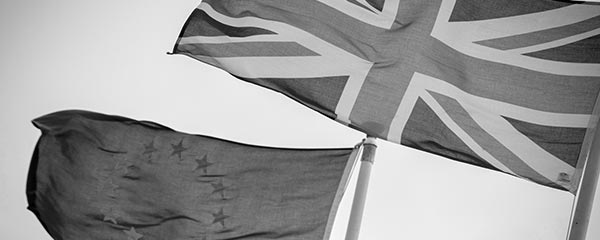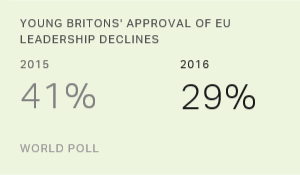Story Highlights
- 43% of Britons approve of EU's leadership vs. 41% for U.K.
- Scotland, Wales and Northern Ireland favor EU leadership
WASHINGTON, D.C. -- In the public's eyes, the leadership of the United Kingdom -- not the European Union -- has been the loser so far in Britain's long march toward a deal or no-deal Brexit.
Britons' approval of the country's leadership sank to 41% in 2019, as deal after deal has failed to make it past parliament. The current rating is notable for two reasons: One, Britons are now essentially as likely to approve of their own leadership as they are to approve of EU leadership; and two, their approval of the EU is remaining steady and on the high side for the trend.

While the House of Commons is poised to vote on the latest iteration of the Brexit deal this week, there are no guarantees that this bill -- at least in its current form -- will make it any further than the previous ones and in time for the Oct. 31 deadline. The political wrangling over the next few days will almost certainly involve the future of ties between the EU and Northern Ireland, Scotland and Wales, where public sentiment in 2019 is slightly more on the side of the European Union.
Nearly half of residents (48%) in these three parts of the U.K. approve of the EU's leadership, while 38% approve of their country's leadership. And they more firmly disapprove of their country's leadership (60%) vs. that of the EU (46%).
In England, residents are split: 41% approve of the EU's leadership and 41% approve of their country's leadership. However, majorities disapprove of each.
| Approve of EU's leadership | Approve of country's leadership | ||||||||||||||||||||||||||||||||||||||||||||||||||||||||||||||||||||||||||||||||||||||||||||||||||
|---|---|---|---|---|---|---|---|---|---|---|---|---|---|---|---|---|---|---|---|---|---|---|---|---|---|---|---|---|---|---|---|---|---|---|---|---|---|---|---|---|---|---|---|---|---|---|---|---|---|---|---|---|---|---|---|---|---|---|---|---|---|---|---|---|---|---|---|---|---|---|---|---|---|---|---|---|---|---|---|---|---|---|---|---|---|---|---|---|---|---|---|---|---|---|---|---|---|---|---|
| % | % | ||||||||||||||||||||||||||||||||||||||||||||||||||||||||||||||||||||||||||||||||||||||||||||||||||
| Northern Ireland, Scotland and Wales | 48 | 38 | |||||||||||||||||||||||||||||||||||||||||||||||||||||||||||||||||||||||||||||||||||||||||||||||||
| England | 41 | 41 | |||||||||||||||||||||||||||||||||||||||||||||||||||||||||||||||||||||||||||||||||||||||||||||||||
| 优蜜传媒World Poll, 2019 | |||||||||||||||||||||||||||||||||||||||||||||||||||||||||||||||||||||||||||||||||||||||||||||||||||
Implications
For Northern Ireland, the question of customs and borders has been a sticking point for many former deals between the United Kingdom and the EU. The current deal abandons the "backstop" designed to avoid a hard border with Ireland, in favor of a new customs border in the Irish Sea.
For the current Brexit deal to survive, the conservatives will need MPs from Northern Ireland to bolster their fragile majority.
The stakes are similarly high in Scotland, where an unsatisfactory deal may prompt it to try to leave the U.K. post-Brexit so it can maintain its EU ties.
The coming weeks will shape the United Kingdom's future and its relationship with not only the European Union but its constituent countries. Or not.
For complete methodology and specific survey dates, please review .
Learn more about how the works.




